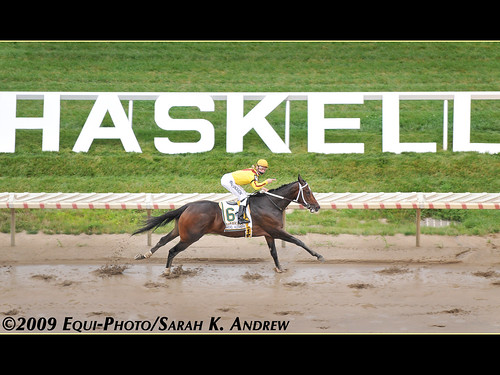Breeders’ Cup
Kentucky Derby-winning owner-breeder Bill Casner is the latest to take up the argument advocating Santa Anita as a permanent site for the Breeders’ Cup. In a column for the Blood-Horse, he hits all the major points — weather, media market access, facilities, financial advantages, the global racing calendar — and concludes pragmatically:
The time is right to make Santa Anita the permanent venue. It is the correct business decision for the Breeder’s Cup event and the future of our industry.
I’ve refrained from commenting on the BC site debate so far, since it’s not one for which I can claim — or expect much assumption of — objectivity. I’ve done some work for the Breeders’ Cup, I welcome any reason to visit Santa Anita, and it’s probably fair to say I’m pro-synthetic surface. But there’s something about the tone of Casner’s piece that signals whatever the discussion among the BC board members, of which Casner is one, about whether to select a permanent site or establish a rotating site schedule, it’s over — all that’s left is coming to an agreement with the likely permanent host site.
So, what will it mean for American racing if the Breeders’ Cup settles at Santa Anita? The game will be more international (in wagering and participants), the event will attract more media attention (as it did this year in earning Emmy and SBJ award nominations). Forget talk of a “civil war,” especially if Santa Anita remains synthetic; there’s too much money and prestige at stake for the most recalcitrant owners and trainers to hold out for long. It will be a major change, but one with real potential for growing the game.
I don’t have much strong feeling about what the BC board seems on the verge of announcing, except on the matter of which track — and in that, they’ve made the right call, if Santa Anita is indeed their plan. There are many arguments for choosing Churchill, arguments not to be dismissed lightly. But, if Churchill Downs were to be named the permanent site, I’m certain that years from now we would look back in regret, pinpointing the decision as the moment the game became irrevocably marginalized, not only internationally, but within the US. Move the Breeders’ Cup to Louisville, and Churchill would become synecdoche for the two biggest events on the calendar, transforming racing from a national sport (niche as it may be) to a regional spectacle. No thanks, to that future. I’d rather see the Breeders’ Cup take a shot at global relevance and a mass audience in the glorious California sunshine.
From Part 2 of the Thoroughbred Times’ interview with Breeders’ Cup consultant William Field:
“I knew that American horse racing had to work in a complex, often out-dated, multi-jurisdictional legal environment. I knew there were a number of different industry bodies, with seemingly overlapping remits. I knew there were many tracks, quite a few of which ran low-quality, sub-scale race days in front of very few fans. But what I didn’t appreciate when I started this was the sheer magnitude of these factors. So, put simply, the sport is even more fragmented than I expected.”
(Part 1 of the interview with Field.)
An observation by Secretary Crickmore, of the Monmouth Park Association, as related by the Thoroughbred Record of April 29, 1893:
There is too little system and method in the conduct of American race tracks.

Rachel Alexandra and Calvin Borel win the Haskell. (Uploaded by Rock and Racehorses to Flickr.)
She’s beaten the winners of the Illinois Derby, Arkansas Derby, Santa Anita Derby, Kentucky Derby, Belmont Stakes, and Tom Fool Handicap. She’s won eight consecutive races, four of those Grade 1s, one a Classic, at six different tracks, and she’s done so by a combined 69 3/4 lengths. Her winning time of 1:47.21 for nine furlongs in the Haskell Invitational came within one-fifth of a second of the Monmouth stakes record; her preliminary Beyer speed figure for the race is 116, which is the highest yet given this year to any horse of any age at any distance over any surface in North America. The leading contender for Horse of the Year, she’s the best of her generation, male or female, and quite possibly, the best American thoroughbred in training.
She’s Rachel Alexandra, and she’s great.
Superlatively speaking: Her Haskell win was preternatural … awesome … surreal … easily the most scintillating seen this year … spine-tingling. (For more, including photos and the race replay, visit R360.)
Meanwhile: Earlier in the day and across the ocean, Breeders’ Cup Mile winner Goldikova turned in a flawless front-running performance to win the Fr-1 Prix de Rothschild. Writes Sue Montgomery in the Independent,
Unlike those commercially driven, demeaning occasions now prevalent at feature race meetings, yesterday was a ladies’ day with a degree of dignity attached. At Deauville, the four-year-old filly Goldikova won the European weekend’s most valuable prize because of her deeds, not her looks. Her class as an athlete was being judged, not the style of her plaits or the colour of her saddlecloth.
Sing it, sister.
The brilliant Goldikova is expected to return to Santa Anita this fall to defend her title. “We’ll follow the same plan as last year,” said trainer Freddie Head.
And at Del Mar: Perfect Zenyatta breezed five furlongs in 1:00 in prep for the Clement Hirsch (video). Could the champion beat Rachel Alexandra, if the two meet? That’ll be the question for the rest of the racing year.
Copyright © 2000-2023 by Jessica Chapel. All rights reserved.